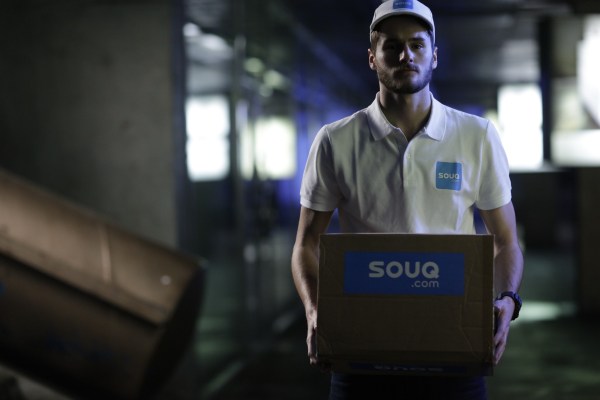E-commerce giants with ambitions to build regional Amazon rivals in emerging markets continue to rake in huge amounts of funding. Today, comes the latest development: Souq — an online marketplace that has been described as the Amazon of the Middle East — has announced that it has closed a funding round of over $275 million (AED 1 billion) to continue building out its business in the region.
We have confirmed with sources that Souq’s post-money valuation is $1 billion. Souq itself is not commenting, though. Ronaldo Mouchawar, CEO and co-founder of Souq tells us it’s because he’s more focused on growing and doesn’t want to distract his team with unicorn talk. (Souq is the first tech company out of the Middle East to reach a 10-figure valuation.)
“I don’t want to make it a focus because we have a lot to do,” he told TechCrunch in an interview, “and I want to keep people motivated.” Bloomberg reported earlier this month that Souq was raising money.
Souq says the funding is the largest-ever round raised in the e-commerce category in the Middle East. It comes from previous investors Tiger Global and Naspers, as well as some strategic investors, including Standard Chartered Private Equity, IFC (a member of the World Bank Group), Baillie Gifford, and “many reputable regional and tech-focused financial institutions.”
This latest funding brings the total raised by Souq to $425 million. Tiger Global and Naspers are prolific investors in the emerging world, with a focus on e-commerce in their wider portfolios. Both Naspers and Tiger invest in Flipkart in India, for example.
Souq says that it will use to scale up its business, which (like Amazon) operates a soup-to-nuts marketplace that works with third party retailers, and sells goods directly to consumers. Unlike Amazon, it has not (yet) moved into areas like cloud services, streaming media or hardware development, although Mouchawar confirmed to TechCrunch that Souq is in the process of looking for suitable media partners to indeed move deeper into areas like streaming.
“The funding will be used to drive further growth by investing in technology, scaling our marketplace operations, launching new product categories and recruiting the best talent,” said Mouchawar, CEO of Souq.com, in a statement. Souq predicts the e-commerce market in the Middle East to reach $20 billion this year. “As the largest e-commerce platform in the region, we focus on the value we bring through technology and job creation. We connect people to products through our retail and marketplace model. Through cutting edge technology, we enable our consumers to make smarter choices and access to mobile commerce is further empowering them.”
Souq was originally founded back in 2005. In a “what could have been” moment, it started life as part of Maktoob, a portal that got acquired by Yahoo, leaving Souq out of the deal as Yahoo was more interested in the portal and media business.
Indeed, Maktoob had been the leading Internet portal in the region, but as with so much else in the Yahoo portfolio, it quickly got left behind with the growth of Google among several other trends that Yahoo didn’t manage to capture. Maktoob eventually shut down in 2014 as part of Yahoo’s long road of winding down unprofitable operations.
Fast forward to today, and it looks like Souq very much got the lucky card in that deal: the company, under co-founder and CEO Mouchawar, has steadily grown along with the Middle East’s own improving Internet connectivity and its expanding middle class. Now, Souq dominates e-commerce in the region out of its Dubai base. “Sometimes, things happen for the right reasons,” he said with a laugh.
Souq says it offers some 1 million products across 31 categories such as consumer electronics, fashion, health and beauty, household goods, and baby. It also says it attracts over 45 million visits per month, with localised portals in United Arab Emirates, Egypt and Saudi Arabia.
Other region-specific marketplaces such as Flipkart and Snapdeal in India have collectively raised billions of dollars to build out their businesses, but it looks like both are focused on expansion in their home market of India, one of the world’s largest countries by population.
In contrast, Souq works across a number of smaller markets, and this seems to point to a lot of potential for the company to expand elsewhere. This would also help it against the likes of Namshi, the company backed by Rocket Internet which in 2014 merged with several other marketplace businesses in Rocket’s portfolio to form the Global Fashion Group.
But they are not the only ones spotting the opportunity. Another competitor includes Wadi.com, which raised $67 million earlier this month also to expand in the region.
One of the reasons why Souq is growing quickly is because of how it’s tailored its platform to work on mobile devices. As with other emerging markets, smartphones are far and away the most common way for consumers to go online, Mouchawar told TechCrunch.
Another is the company’s forays into adjacent areas like payments.
“Further growth is inherent from being in a market with the highest mobile penetration in the world and continued adoption of mobile commerce by our customers. Souq.com is constantly enhancing its customer experience, for both buyers and sellers,” said Mouchawar. “SMEs in particular are true growth drivers in our economy and our aim is to empower merchants to reap the benefits of e-commerce and further drive growth via mobile. Capitalising on the step-change in consumer behaviour and business benefit towards mobile commerce, Souq.com will continue to lead the e-commerce industry in the region.”
Another is Souq’s movement into payments. The company owns its own payment gateway called Payfort, and this has been a way to get merchants selling online not just on Souq but elsewhere, too, he notes. One future step, he says, will be to take Payfort into offline payments, potentially with point-of-sale services.
Updated with further comment on valuation from Souq and CEO Ronaldo Mouchawar.
